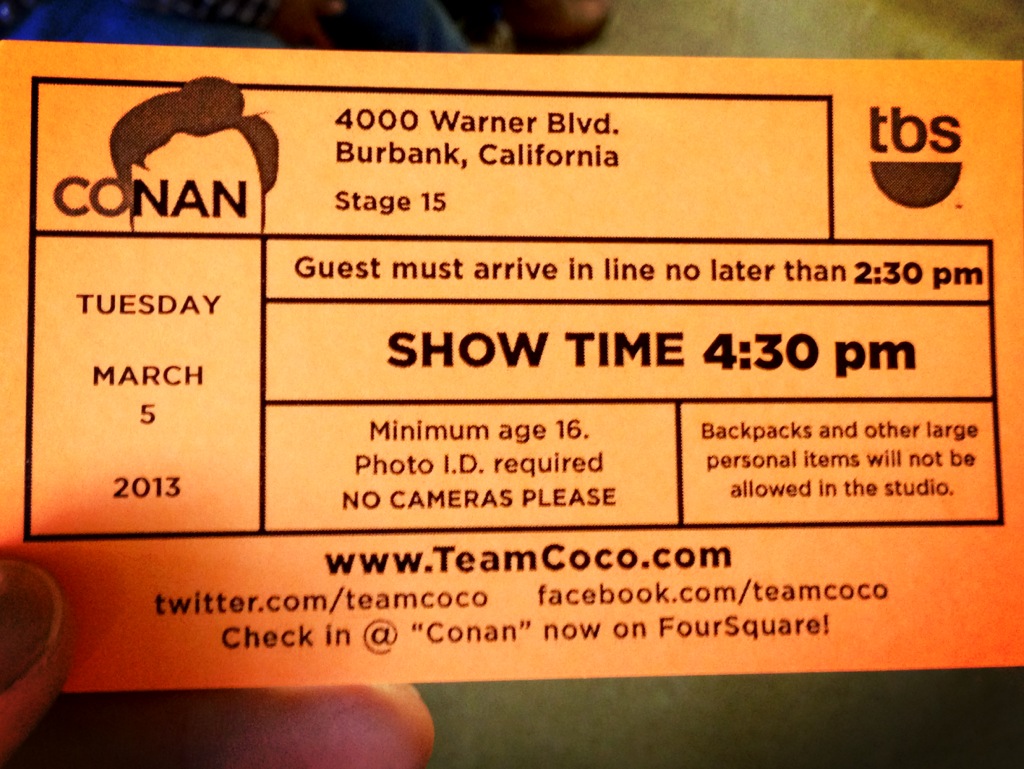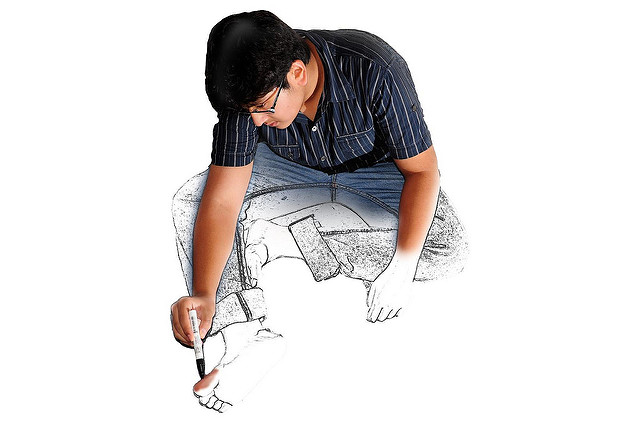In March I had gone to see a taping of Conan on the Warner Bros lot. Colin Farrell was on the show, as was Jenna Elfman.

What sticks out most in my mind wasn’t Colin’s new movie trailer, or Jenna pantomiming a blowjob, but something I noticed afterwards, when the cameras finished rolling, and everyone rose from their seats, prepping for the mass exodus:
Conan O’Brien walks back to the set. A woman stands there waiting for him, probably a set PA. Without looking her in the eye or saying thank you, he hands her his microphone, then disappears behind the stage. The set PA disappears in the other direction.
It’s an innocuous thing, really. He wasn’t rude: he didn’t throw the mic at her, or like, spit on her or anything. But I believe the sum of our thousand innocuous actions throughout the day paint an accurate portrait of who we are and how we view the world:
- Do you hold open doors for others?
- Do you hold open doors for strangers?
- Do you arrive on time?
- Do you say “please?”
- Do you say “thank you?”
- Do you turn to the waiter when they greet you?
- Do you greet them back or just start reciting your order?
- Do you look them in the eye when you order or leave your face buried in the menu?
- What about when you hand them the menu — do they deserve your attention then?
- Or do you think none of that is necessary if you give them a 20% tip?
- Do you know the names of your interns? Of your PA’s? Your assistants?
- Do you thank them for their time?
- For the scripts they cover and the unsolicited manuscripts they read?
Getting away with any of the above, without rebuke or reprimand, is a sign of higher status. In the dizzying rush to reach that status or level of success, it’s easy to say, “I’m going to emulate that behavior.” After all, people who’ve climbed to these levels reached it for good reason (not all, but many). It’s not hard to pick up bad habits.
There are stretches of days and weeks where I feel suffocated by these bad habits. Which is when I need to remember that I’ved worked for people who understand the concept of mutual respect. Gentlemen like Mark Teschner, who looks you in the eye when he shakes your hand, and remembers an actor’s name after a whirlwind casting session of 50 actors for one role.
I’m glad to read that even at the agencies, you still come across gentlemen like Sam Haskell, who Rob Carlson (partner at WME) described in THE MAILROOM by David Resin as “the best agent in that building”:
Because of his attitude and his personality, his ethics and his family values, he turned out to be probably the best agent in that building, and he did it by being different from everybody else. That was the biggest surprise for me: that you could be that great a person and still be amazing at your job. You didn’t have to be a jerk. You didn’t have to treat people like shit. You didn’t have to treat your assistants terribly. Every night Sam would walk out, and no matter how bad a day we’d had, or if I’d fucked up, he’d say, “Rob, thank you very much my friend. I appreciate it. Have a good night. I’ll see you tomorrow.” Every night.
There are times I wonder, “what is the point of this? What’s the point of listening and reading and writing about self-development?” Moments like the Conan-moment above remind me that for most of us, on a day-to-day basis, we can’t choose the people who surround us. We can’t always distance ourselves from their habits we’d like to avoid. But that isn’t our excuse for our own bad habits, because the behaviors we do want to emulate: good habits, mental frameworks, philosophies, strategies, and tactics — they’re never more than a click away.
Jim Rohn said, “You are the average of the five people you spend the most time with.” So spend time with the right people — even if you have to pipe their words directly into your brain, from a podcast, or a book.
Photo Credit: mrehan

Comments are closed.